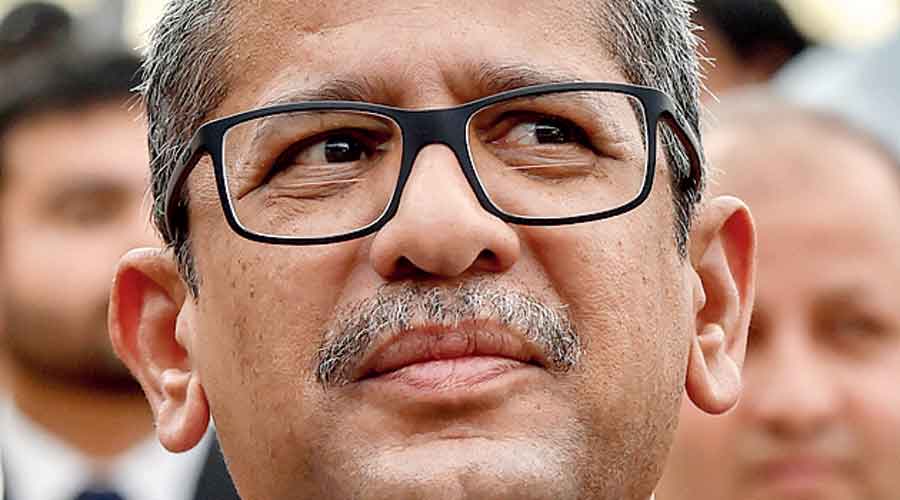An in-house committee of the Supreme Court has dismissed Andhra Pradesh chief minister Jagan Mohan Reddy’s allegations of corruption and impropriety against Justice N.V. Ramana, the second senior-most judge, the apex court spokesperson confirmed on Wednesday.
The decision clears the decks for Justice Ramana to take over as Chief Justice of India — the first former journalist to rise to the post — from April 24 after the incumbent, Chief Justice S.A. Bobde, retires on April 23.
The in-house panel, headed by Justice Bobde, found Jagan’s allegations “extremely malicious, motivated and frivolous with an intention to browbeat the entire judicial system”, sources privy to the inquiry said.
The sources declined to reveal details citing confidentiality. In keeping with protocol, the in-house panel did not include Justice Ramana.
Jagan had written to Chief Justice Bobde on October 6 alleging Justice Ramana’s two daughters had illegally acquired land at Amaravati in Andhra.
He further alleged that Justice Ramana was interfering with the functioning of Andhra Pradesh High Court to favour Jagan’s political rival and former chief minister N. Chandrababu Naidu.
Legal sources had at the time suggested that Justice Ramana was being targeted because he headed a bench that had directed the establishment of special courts to speed up the trials in criminal cases against all lawmakers across the country.
Jagan faces 31 criminal cases, mainly for alleged corruption and money-laundering, and his allegations were seen as an attempt to browbeat the judiciary into going slow against him.To avert speculation about the in-house inquiry, the apex court spokesperson issued a written statement on Wednesday, saying: “A complaint dated 6th October sent by the chief minister of Andhra Pradesh to the Supreme Court was dealt with under the in-house procedure and the same on due consideration, stands dismissed.
“It be noted that all the matters dealt with under the in-house procedure being strictly confidential in nature are not liable to be made public.”
The Bar Council of India and Bar associations across the country had condemned the allegations after Jagan released his letter to the media.
Jagan’s charges against Justice Ramana have led to two contempt petitions against the chief minister in the Supreme Court, and to an order by Andhra Pradesh High Court for a CBI probe against the YSR Congress leader.
Undeterred by the allegations, Justice Ramana had on October 18 last year, while delivering the Justice A.R. Laxmanan Memorial Lecture, urged judges to be “steadfast” and “fearless”.
He had exhorted them to “withstand all pressures and odds and to stand up bravely against all obstacles”, saying the judiciary’s greatest strength was the people’s faith in the institution. The remark was seen as a rejoinder to Jagan.

Chief Justice S.A. Bobde Telegraph picture
Progressive judge
Sources said Justice Ramana, who will be India’s 48th Chief Justice and continue in the post till August 26, 2022, held strong progressive views and was a champion of free speech and democratic rights.
Last May, a bench headed by him had directed the Centre to set up a committee to review the restoration of full-fledged Internet services in Jammu and Kashmir, and followed it up with a series of orders that led to Net connectivity being eventually restored.
Justice Ramana will be the first judge from Andhra Pradesh to become Chief Justice of India. Justice Koka Subba Rao, also a Telugu, held the post between June 30, 1966, and April 11, 1967, but he came from the undivided Madras state and was a Madras High Court judge.
As a young man, Justice Ramana had participated in demonstrations seeking a separate Andhra Pradesh state. Among the movement’s leaders was the present Vice-President, M. Venkaiah Naidu.
Born in a farming family on August 27, 1957, in Ponnavaram village, Krishna district, Justice Ramana had worked as a journalist between 1979 and 1980, reporting on political and legal matters for the Eenadu newspaper.
He was enrolled as an advocate on February 10, 1983. He specialised in constitutional, criminal, service and inter-state river laws and practised in Andhra Pradesh High Court.
He was appointed a permanent judge of Andhra Pradesh High Court in 2000, became Delhi High Court chief justice in 2013 and joined the Supreme Court in 2014.










